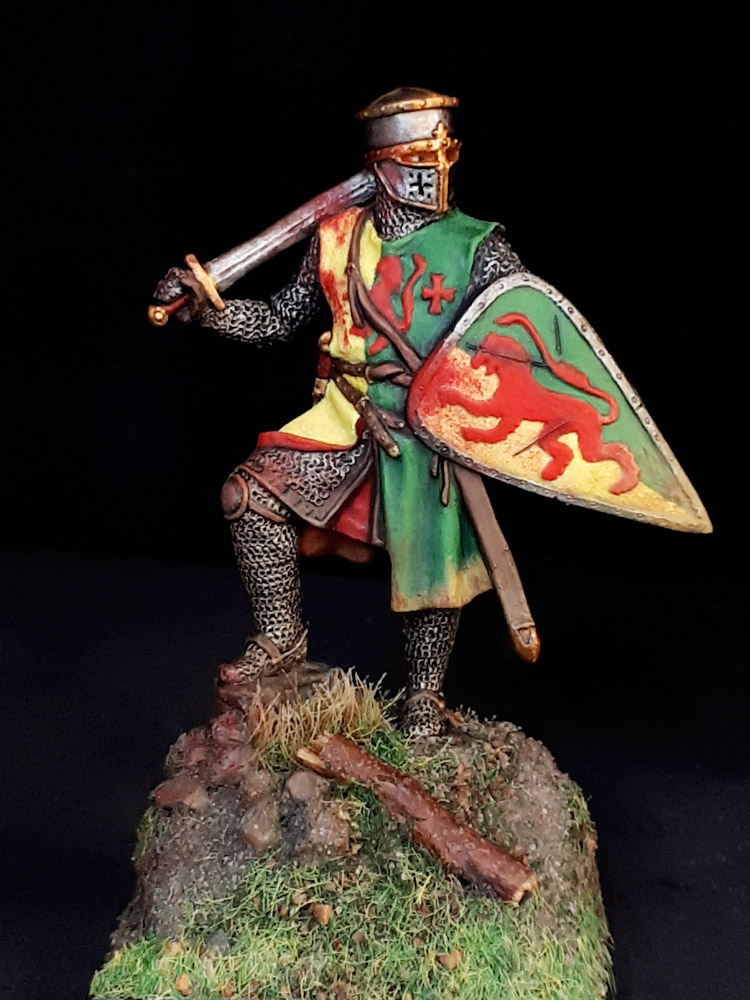
William Marshal born in 1146 or 1147 and dying in 1219, had a long (for the times) and extraordinary life! Throughout his remarkable life he served five English kings! – Henry II, his sons the “Young King” Henry, Richard I, John, and John’s son Henry III.
As a younger son of a minor nobleman, William had no lands or fortune to inherit. During the civil war known as ‘The Anarchy’ that raged in England between 1135-1153. His father John Marshal switched sides from King Stephen to Empress Matilda in 1139.
When King Stephen besieged Newbury Castle in 1152 the young William was used as a hostage with the threat he would be hung if the castle was not surrendered, his father refused! But Stephen could not bring himself to harm young William. William remained a crown hostage for many months, and was released following the peace resulting from the terms agreed at Winchester on 6 November 1153, by which the civil war was ended.
Around the age of twelve, he was sent to the Château de Tancarville in Normandy to be brought up in the household of William de Tancarville, a cousin of young William’s mother. Here he began his training as a knight. He was knighted in 1166 on a campaign in Upper Normandy, then being invaded from Flanders and aquitted himself well in battle. In 1167, he was taken by William de Tancarville to his first tournament, where he found his true calling. As a knight errant and a successful tournament competitor. Stephen Langton (Archbishop of Canterbury between 1207 and 1228) eulogized him as the “best knight that ever lived”.
Quitting the Tancarville household he then served in the household of his mother’s brother, Patrick, Earl of Salisbury. In 1168, his uncle was killed in an ambush by Guy de Lusignan (French knight and future King of Jerusalem) while escorting Queen Eleanor (wife of King Henry II). William received a wound to his thigh and was captured in the same skirmish. After a period of time, he was ransomed by Eleanor, who was apparently impressed by tales of his bravery.
In 1170, Marshal was appointed as Young King Henry’s tutor-in-arms by the Young King’s father, Henry II. From 1176-1182 both Marshal and the Young King travelled throughout Europe and gained prestige from winning tournaments. Marshal became a legendary tournament champion!
In 1182, Marshal was accused of having an affair with the Young King’s wife, Margaret of France. While the affair very strongly appears to have been fabricated by Marshal’s political enemies he was removed from the Young King’s service.
Young King Henry declared war against his brother, Richard the Lionheart, in January 1183. Marshal had been cleared of all charges against the Young King, and returned to his service. However, the Young King became sick in late May, and died on 11 June 1183. In late 1183 Marshal took up the cross and undertook a crusade to the Holy Land, due to a promise he made to the Young King on his deathbed. After his return from the Holy Land in late 1185 or early 1186, William rejoined the court of King Henry II, and now served as a loyal captain through the many difficulties of Henry II’s final years.
In 1188 Philip II of France attempted to seize the disputed region of Berry, Henry II summoned the Marshal to his side. During the resulting campaign, the king fell out with his heir Richard, count of Poitou, who consequently allied with Philip II against his father!
In 1189, while covering the flight of Henry II from Le Mans to Chinon, William unhorsed the future King Richard in a skirmish. William could have killed the prince and to prove that point he instead killed his horse. He is said to have been the only man ever to unhorse Richard.
After Henry II’s death, Marshal was welcomed at court by his former adversary now King Richard I, perhaps due to sparing his life? or more likely to include a man whose legendary loyalty and military accomplishments were too useful to ignore.
In 1189, King Richard confirmed that Marshal at the age of 43 marry the 17-year-old daughter of Richard de Clare (Strongbow). Her father had been Earl of Pembroke, and Marshal acquired large estates and claims in England, Wales, Normandy and Ireland, The marriage transformed the landless knight from a minor family into one of the richest men in the kingdom!
When King Richard departed for the Third Crusade in 1190, he left political authority in England – the post of justiciar – jointly in the hands of Bishop Hugh de Puiset and William de Mandeville, 3rd Earl of Essex, and made William Longchamp, the Bishop of Ely, his chancellor. The political situation in England rapidly began to deteriorate on the death of Mandeville with Longchamp refusing to work with Puiset. Richards brother John exploited this situation to set himself up as an alternative ruler with his own royal court.
William took the side of John, the king’s brother, when the latter expelled the justiciar, William Longchamp, from the kingdom, but he soon discovered that the interests of John were different from those of Richard. And in 1193 he joined with the loyalists in making war upon John.
After King Richard finally returned to England in 1194 Marshal served the king in his wars in Normandy against Philip II. On Richard’s death-bed in 1199, the king designated Marshal as custodian of Rouen and of the royal treasure during the gap between rulers.
William supported King John when he became king in 1199, it was a continual rocky relationship between King John and William. Despite their differences, William remained loyal throughout the hostilities between John and the rebel barons which culminated on 15 June 1215 at Runnymede with the sealing of Magna Carta. Upon the death of King John, William Marshal was named by the king’s council to serve as protector of the nine-year-old King Henry III, and regent of the kingdom.
Even though he was aged around 70 he waged a war against Prince Louis (future King of France) and the rebel barons with remarkable energy. In the battle of Lincoln 1217 he charged and fought at the head of the young King’s army, leading them to victory!
Marshal’s health finally failed him early in 1219 and eventually died on 14 May at Caversham. Fulfilling a vow he had made while on crusade, he was invested into the order of the Knights Templar on his deathbed, and was buried in the Temple Church in London, where his tomb can still be seen today.
